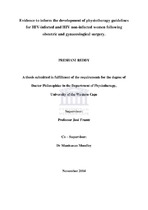| dc.description.abstract | Methods to improve women’s health have become an urgent global priority. Development of clinical guidelines is viewed as a way of improving the quality of health care in South Africa. At present there are no physiotherapy guidelines for women post-caesarean section delivery (CSD) and post-hysterectomy, which are the most common procedures performed by obstetricians and gynaecologists. South African women have the highest HIV-prevalence rates in the world, but there is a global dearth of literature on common postoperative complications for this cohort of women. The aim of this study was to provide evidence supporting the development of physiotherapy clinical guidelines relevant for HIV-infected and HIV non-infected women following caesarean section delivery and hysterectomy. The overall design of the study was prospective, descriptive and explanatory, with longitudinal, comparative and cross-sectional components incorporated at the different phases of the study. An amalgamated four-phase conceptual framework with specific objectives per phase was used to achieve the study aim. Phases 1 and 2 were conducted at four public hospitals in KwaZulu-Natal. Phase 1 identified the long-term complications and quality of life for HIV-infected and non-infected women post-CSD (N=310) and hysterectomy (N=101) over a six- month period; phase 2, which was cross-sectional in nature, identified treatment strategies and complications described by physiotherapists (N=31) for this cohort of women. Purposive probability sampling and purposive convenient sampling was used to select potential participants for phases 1 and 2. A self-administrated questionnaire with close and open-ended questions was used in the first two phases of the study. During phase 3, a systematic review and Delphi method (N=12) were used to investigate current management strategies of representative physiotherapists. Purposive sampling was used to select the participants who are considered as experts in the field of women’s health, for the Delphi study. The information from phases 1 to 3 was collated in phase 4 to provide the evidence to inform the development of the clinical guidelines. Phase 1 revealed that physical health complications commonly persisted for at least six months and negatively affected the quality of life of women post-CSD or post-hysterectomy. Phase 2 showed that very few patients post-CSD and hysterectomy were being referred for physiotherapy, and of those referred, the main problem being treated was respiratory complications. A systematic review of the literature yielded only one article relevant to the outcome of management of patients post- hysterectomy, thus illustrating the dearth of literature in this area. The experts who were consulted for the Delphi study suggested treatment techniques for the postoperative complications identified in phase 1, and consensus was reached on the techniques in the second Delphi round. The results were then collated in the final phase and presented in tables containing the identified problem, treatment and best available evidence to move towards the development of the guidelines. The common postoperative morbidities that were identified in this study can be prevented or treated with physiotherapy, but information is needed in this area to guide treatment practices. The prevention of postoperative complications can result in a decrease in demand for services, thereby reducing the current strain on the health system. The current study contributed to 18 of the 23 criteria in the appraisal of guidelines for research and an evaluation tool. The conceptual framework used to generate the evidence can also be employed in other facets of health care. In order to improve the quality of health care rendered to women, health care professionals require a complete picture of their patient. This research adds to the body of knowledge in an area where there is a dearth of literature and provides a platform to develop clinical guidelines. No national research exists that compares the postoperative complications of HIV-infected and non-infected women, which is essential to enable comprehensive care of HIV-infected women. The guidelines that will be developed can improve the quality of health care rendered to women, and establish the role of physiotherapists in this area. | en_US |

